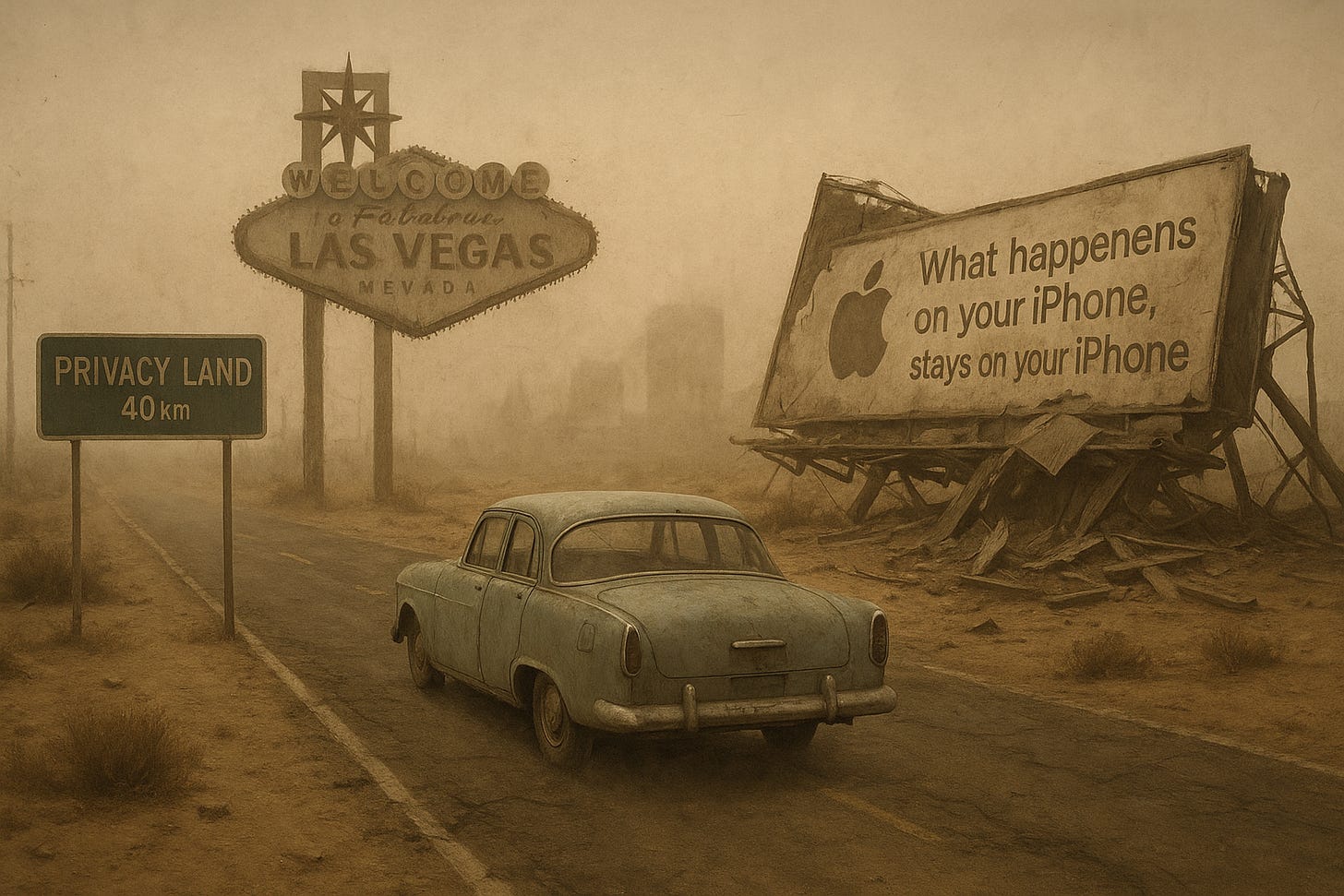🔒 Privacy or cutting-edge online services? Why not both?
For years, we’ve traded our data for “free” services. Now, a new wave of startups is proving it’s possible to offer convenience without being invasive. Just talk, or real action?
Here I am on a Sunday night, lost in a retrospective haze, thinking about how we got here. Back in 2019, a tech giant plastered a massive billboard in Las Vegas that read: “What happens on your smartphone stays on your smartphone.”
It was Apple poking fun at the competition, turning privacy into a competitive edge, and selling iPhones like crazy. Meanwhile, a small search engine with a name straight out of a cartoon duck’s vault (hello, DuckDuckGo) was winning over users by delivering results without tracking anyone. And one of WhatsApp’s co-founders walked away from a fortune, leaving Facebook to launch a nonprofit messaging app that doesn’t spy on its users (Signal).
And you still think privacy doesn’t sell?
Stories like these prove that the idea of having to choose between privacy and great service is outdated, they should go hand in hand.
For a long time, we were made to believe this mantra: if it’s free, you’re the product. Do you want to use social media, email, or free games? Then pay with your data.
Marketing experts called it the price of magic: algorithms needed to track every click and like to deliver personalized feeds and “relevant” ads. Convenience first, privacy last… it was practically a Silicon Valley dogma. And we, with no real choice, accepted the Faustian bargain, cool services in exchange for being watched 24/7.
But then the cracks started to show. Leak after leak, scandals like Cambridge Analytica (which now feels like a digital appetizer compared to today's breaches), scams everywhere, suddenly, the deal didn’t seem so fair.
Does it still seem fair to you?
People began to question: is it really worth giving companies unrestricted access to our lives for a meme or free shipping? Governments stepped in too. The EU gave Big Tech a wake-up call with the GDPR, and the rest of the world followed with similar regulations. The result? Even companies that built empires on data now swear “privacy is a priority.” (Not out of sudden goodwill, but because skeptical users and massive regulatory fines hit where it hurts… sometimes in the form of plummeting stock prices.)
Luckily, technology evolved. It’s absolutely possible to have smart online services without snooping on users. End-to-end encryption already lets you message and video call without even the platform knowing what you said. Cryptographic proofs now allow you to verify you're over 18 without revealing your birthdate (I’ve talked about zero-knowledge proofs here before).
Federated learning and on-device processing show you can train algorithms and personalize your experience right on your phone, no need to send your data to the cloud. In other words, you can have AI and convenience without the creepy digital peeping tom.
And what about business models? Can you make money while respecting privacy? Apple seems to think so: it earns billions selling devices and premium services, proudly stating it doesn’t need to sell your soul (I mean, your data) to advertisers.
Subscription-based services like Netflix and Spotify charge real money instead of collecting your personal details, which lowers their appetite for poking into your private life (they already get your paycheck at the end of the month). Then there’s the community-funded route: Wikipedia runs on donations and shares knowledge without dropping tracking cookies on your computer.
Apps like Signal are backed by a nonprofit foundation and volunteers, proving not everyone is for sale.
Back to 1999, when the internet was innocent? Not exactly…
Even in the ad world, some startups are flipping the script, browsers that pay you to view anonymous, optional ads, or search engines that show ads based on your current keyword, not your life history. Good old contextual advertising making a comeback, turns out, maybe they don’t need to know your dog’s name to serve you a decent pet food ad.
At the end of the day, protecting user privacy without compromising service quality isn’t just possible, it’s becoming a competitive edge. Digital excellence can coexist with respect for personal data, as long as there's a will to innovate and a public that values it.
Will companies give us great products without treating us as the product?
In my view, the real “secret” is this: privacy doesn’t kill services, it just threatens lazy business models. And if you set out on this long road to the land of privacy, your business will thrive.




I love that humans are valuing their privacy again!! It goes hand in hand with justice and freedom!
Now, users are waking up and realizing their data is powerful. And the companies respecting that? They're not just doing the right thing, and they’re winning.